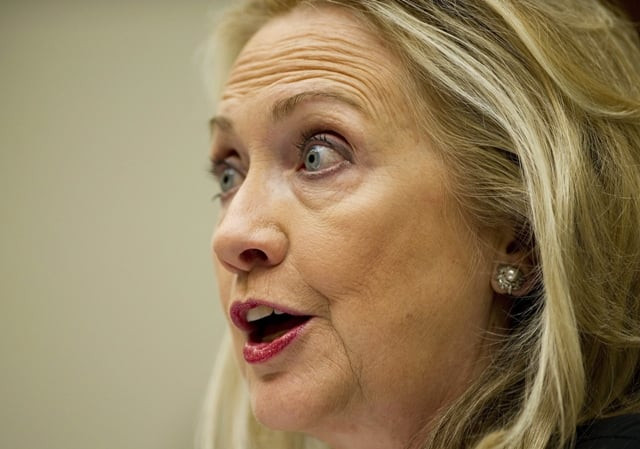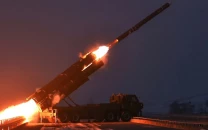Israeli settlement expansion 'sets back' peace bid: Clinton
Lasting solution to Gaza stalemate would be a comprehensive peace between Israel, Palestinians: Secretary of State

The White House earlier called the move - which came in response to a historic vote in the UN General Assembly on Thursday to recognize Palestine within the 1967 borders as a non-member observer state - "counterproductive."
"In light of today's announcement, let me reiterate that this administration - like previous administrations - has been very clear with Israel that these activities set back the cause of a negotiated peace," Clinton said.
She was speaking at a forum in Washington hosted by the Saban Center for Middle East Policy, to an audience that included Israeli Foreign Minister Avigdor Lieberman and Defense Minister Ehud Barak.
"The most lasting solution to the stalemate in Gaza would be a comprehensive peace between Israel and all Palestinians, led by their legitimate representative, the Palestinian Authority," Clinton said.
President Barack Obama's administration tried to stop the Palestinian push for recognition at the UN, saying it would put another obstacle in the path to peace and that statehood could only come through negotiations with Israel.
"This week's vote should give all of us pause. All sides need to consider carefully the path ahead," Clinton said.
"We all need to work together to find a path forward in negotiations that can deliver on the goal of a two-state solution. That remains our goal.
"If and when the parties are ready to enter into direct negotiations to solve the conflict, President (Barack) Obama will be a full partner to them."
In a question and answer session following her prepared remarks, Clinton said she wanted Israel to occupy the moral high ground.
"I think that even if you cannot reach a complete agreement that resolves all these incredibly hard issues, it's in Israel's interest to be trying," she said. "It gives Israel a moral high ground that I want Israel to occupy. That's what I want Israel to occupy, the moral high ground."
Earlier, National Security Council spokesman Tommy Vietor said: "We reiterate our longstanding opposition to settlements and east Jerusalem construction and announcements.
"We believe these actions are counterproductive and make it harder to resume direct negotiations or achieve a two-state solution."
Media reports said some of the Israeli construction would be in a highly contentious area of the West Bank known as E1, a corridor that runs between the easternmost edge of annexed east Jerusalem and the Maaleh Adumim settlement.
The PLO condemned the move as an act of "Israeli aggression against a state."
Palestinians bitterly oppose the E1 project, as it effectively cuts the occupied West Bank in two, north to south, and makes the creation of a viable Palestinian state highly problematic.
The Palestinians want east Jerusalem as capital of their state and vigorously oppose expansion plans for Maaleh Adumim, which lies five kilometers (three miles) from the city's eastern edge.
US condemnations of Israeli settlement building has been a key factor in past clashes between Obama and Israeli Prime Minister Benjamin Netanyahu.
The two leaders now have a tense relationship, despite the Obama White House's arguments that it has done more to safeguard Israeli security than any previous administration.



















COMMENTS
Comments are moderated and generally will be posted if they are on-topic and not abusive.
For more information, please see our Comments FAQ